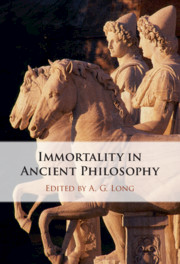Book contents
- Immortality in Ancient Philosophy
- Immortality in Ancient Philosophy
- Copyright page
- Contents
- Contributors
- Introduction
- Chapter 1 The Soul and the Celestial Afterlife in Greek Philosophy before Plato
- Chapter 2 Pythagorean Immortality of the Soul?
- Chapter 3 The Philosopher’s Reward: Contemplation and Immortality in Plato’s Dialogues
- Chapter 4 Pre-Existence, Life after Death, and Atemporal Beings in Plato’s Phaedo
- Chapter 5 The Immortal and the Imperishable in Aristotle, Early Stoicism, and Epicureanism
- Chapter 6 Socrates and the Symmetry Argument
- Chapter 7 Immortality in Philo of Alexandria
- Chapter 8 Plotinus on Immortality and the Problem of Personal Identity
- Chapter 9 Truth and Immortality in Augustine’s Soliloquies and De Immortalitate Animae
- Index of Passages
- Index of Names and Subjects
- References
Chapter 7 - Immortality in Philo of Alexandria
Published online by Cambridge University Press: 20 May 2021
- Immortality in Ancient Philosophy
- Immortality in Ancient Philosophy
- Copyright page
- Contents
- Contributors
- Introduction
- Chapter 1 The Soul and the Celestial Afterlife in Greek Philosophy before Plato
- Chapter 2 Pythagorean Immortality of the Soul?
- Chapter 3 The Philosopher’s Reward: Contemplation and Immortality in Plato’s Dialogues
- Chapter 4 Pre-Existence, Life after Death, and Atemporal Beings in Plato’s Phaedo
- Chapter 5 The Immortal and the Imperishable in Aristotle, Early Stoicism, and Epicureanism
- Chapter 6 Socrates and the Symmetry Argument
- Chapter 7 Immortality in Philo of Alexandria
- Chapter 8 Plotinus on Immortality and the Problem of Personal Identity
- Chapter 9 Truth and Immortality in Augustine’s Soliloquies and De Immortalitate Animae
- Index of Passages
- Index of Names and Subjects
- References
Summary
The Jewish exegete Philo of Alexandria speaks of death and immortality in several different ways. He may refer to the higher or lower part of the soul or the body, and mean either moral or ontological death. Not all combinations are possible; e.g., Philo never says the soul’s leading part could cease to exist, and the body can neither undergo moral death nor avoid the physical one. Three types of Philonic discourse are discussed: human mortality caused by the body, the soul’s moral corruption that Philo calls its death, and the ontological immortality of the mind. Despite the last one, Philo speaks of attaining immortality. This is not an inconsistency but refers to the mind’s liberation from its mortal companions (the body and the mortal portion of the soul) so that only its congenital immortality remains. Attaining immortality also means the end of the repeated deaths in the cycle of reincarnation, and the mind’s restoration to its original state of blessedness.
Keywords
- Type
- Chapter
- Information
- Immortality in Ancient Philosophy , pp. 161 - 177Publisher: Cambridge University PressPrint publication year: 2021

